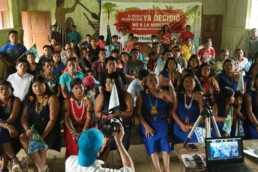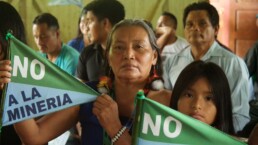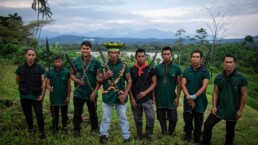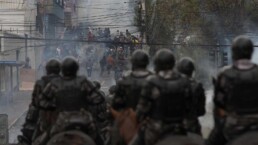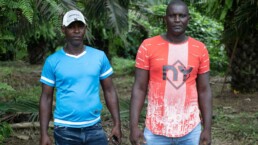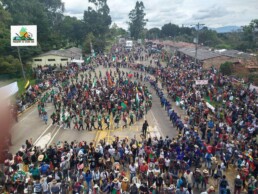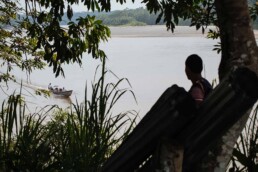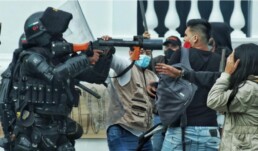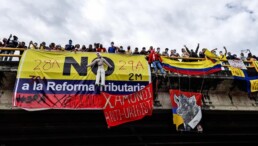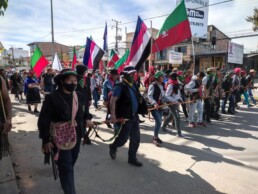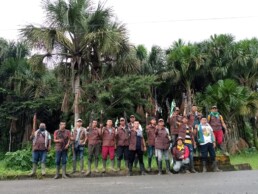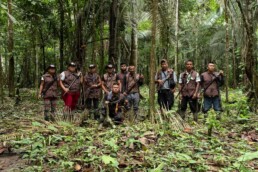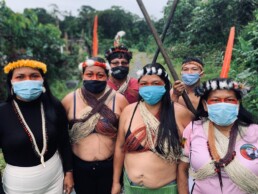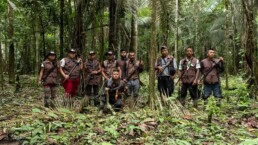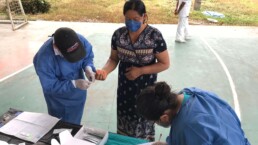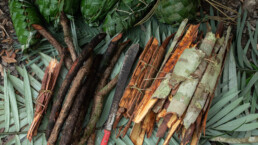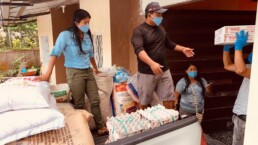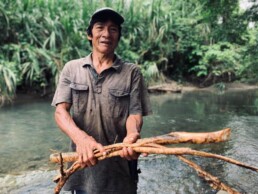New Report by Ecuadorian Human Rights Coalition Exposes Mounting Threats Against Rights Defenders
15 June 2021, Quito – This morning, Ecuador’s Alliance for Human Rights delivered a hard-hitting new report to government authorities and the Ombudsman’s Office on the critical situation of rights defenders in the country. The report, entitled “Rights Defenders Under Threat in Ecuador: How Government Protection is Insufficient and Favors Industry Interests,” reveals the intensifying dangers that rights defenders face as part of their struggles to protect and defend their territories, autonomy, and identity, and puts the spotlight on state and industry complicity to undermine their vital work.
The report, published by a coalition of nineteen human rights organizations in Ecuador, maps systematic rights violations against rights defenders including intimidation, threats, harassment, prosecution, persecution, and even assasinations, committed principally by the armed forces, national police, and public officials. Through the documentation of twenty-two emblematic cases from the Amazon to the Andes and the coast, the report exposes the experience of 449 rights defenders over the last decade. Three assassinations linked to the mining sector notably continue with impunity.
The work of human rights and environmental defenders in Ecuador, one of the world’s most biodiverse countries, is vital to the protection of critical natural ecosystems such as the Amazon rainforest and fundamental for the protection of democracy and the rule of law. The report finds that across the country, rights defenders face escalating violence, especially in situations of conflict linked to the extractive industries and the energy sector, which account for eighteen of the twenty-two cases presented in the report. Oil, mining, agribusiness, and the water sector are consistently the biggest drivers of attacks against rights defenders. With Ecuador’s new government set to ramp up natural resource extraction in the context of the global economic crisis of the pandemic and the country’s crippling debt to China and the International Monetary Fund, this worrisome trend risks only intensifying.
Rights defenders from Indigenous, afro-descendant, and montubios communities, and especially women, face disproportionate risks of violence. The majority of cases detailed in the report represent communities on the frontlines of resistance movements opposing extractive industries driving the climate crisis and the destruction of nature. Alarming instances of the government’s systematic violation of Indigenous people’s rights to prior consultation and Free, Prior, and Informed Consent (FPIC) are registered as part of the report, as well as violations to the right to environmental prior consultation by the Ecuadorian government in complicity with companies. These grave abuses against the rights and lives of historically marginalized and vulnerable communities, and the forests and rivers that they protect, undermine Ecuador’s pioneering Constitution that declares the country to be a plurinational and intercultural country, and grants rights to nature.
The cases presented in the report also demonstrate the Ecuadorian government’s flagrant failure to safeguard the vital and peaceful work of rights defenders and outlines the tactics employed by the government and industry to quash protests and weaken resistance movements, and maintain a legacy of corporate impunity, as devastatingly evidenced in cases in the Amazon rainforest. Stigmatization and even the criminalization of defenders through an abusive use of the justice system feature widely throughout the cases. The report demonstrates Ecuador’s non-compliance with signed treaties, pacts, and international instruments that guarantee the protection of rights defenders, such as the Declaration on Human Rights Defenders of the United Nations and the Escazú Agreement – an international treaty that includes the world’s first binding provision on human rights defenders in environmental matters.
Among the report’s chief recommendations are the urgent need for the Ecuadorian government to establish clear and culturally appropriate mechanisms of protection, reparation and non-repetition in cases of murder, threats, and intimidation that affect rights defenders and their families.
Ecuador’s Alliance for Human Rights intends for this first edition of the report to provide fundamental recommendations for the construction of a public policy to guarantee the work of human and environmental rights defenders, which has been under development by an inter-institutional roundtable under the leadership of Ecuador’s Ombudsmen since 2019. Over this period, high instances of State-led harassment, intimidation, violence, and criminalization against rights defenders have been recorded. This is most visible in the severity of the cases of Andrés Durazno (one of the three defenders murdered), the communities and defenders of the April 7th, 2020 oil spill, the Shuar Arutam People, and the defenders within the case of modern slavery against the company Furukawa, Buenos Aires, Explocen, and others.
Declarations:
Josefina Tunki, President of the Shuar Arutam People (PSHA) & Indigenous leader opposing mining in the southern Ecuadorian Amazon:
“We continue to be persecuted for our work in defense of our ancestral territory. We face multiple threats; our territory is being contaminated by mining operations and our families are being divided by the companies. I have personally received death threats from the Vice-President of Solaris, a mining company with 26 concessions on our land. The government must listen to us. As Indigenous peoples, we have clearly said that we do not want to be consulted and that the mining companies must leave our territory. We defend our territory because it is our heritage and legacy. There are no other spaces to live. We fight for the good life of our grandchildren. We demand that our right to self-determination and life be respected.”
Carlos Jipa, Kichwa Leader & Plaintiff in the Kichwa people’s case after a massive oil in Ecuador’s Amazon:
“Over a year has passed since a massive oil spill struck our territories. 27,000 Indigenous peoples are still without access to clean water and food. We feel outraged that the Ecuadorian judicial system has failed to recognize the violations to our rights and the damages caused to our lives, our rivers, and our territory. Our rivers are polluted, our children are sick, our food gardens are ruined, the fish have disappeared. The State and companies have not complied with their obligations. What’s more, oil operations are still contaminating our rivers and threatening our lives. There is no justice for Indigenous people. We will fight back.”
María Espinosa, Human Rights Lawyer from Amazon Frontlines and part of the legal team for Ecuador’s Alliance for Human Rights:
“Those of us who defend human rights defend a dignified life. We confront those who abuse power, including extractive companies, public officials, and members of the public force, as they seek to forcefully impose their agenda through coercion or rights violations. Our work poses a direct threat to their illegitimate authoritarianism, and they seek to undermine and dissuade our work. This puts us at risk. The Ecuadorian government has a concrete and urgent obligation to guarantee and protect our work as rights defenders.”
Elizabeth Durazno, Rights Defender from Molleturo community and niece of the late environmental defender Andrés Durazno who fought against a mining project in the Andes:
“The military entered our communities in Rio Blanco in 1995 during Rafael Correa’s government. Our rights have not been respected. Our territory has been destroyed and our families divided. But we continue to resist because we will not allow more rights violations. We continue to build solidarity with other human rights and environmental defenders across the world.”
Sofía Jarrín, Ecuador Advocacy Advisor at Amazon Watch, one of the 19 organizations part of Ecuador’s Alliance for Human Rights:
“Addressing the situation of rights defenders in Ecuador is urgent. There is no government protection for the lives of those who seek to defend rights and stop abuses of power. It is also inexcusable that attacks against 449 human rights defenders go unpunished. We want to build a more democratic society and create safe environments for the enforceability of rights in the country. This is the first step.”
Gabriela Fraga, Rights Defender and anti-mining movement leader from the community of Merced de Buenos Aires in the Andes:
“Criminalization against rights defenders is totally outrageous and unfair. Authorities use this tactic to try to intimidate us and to delegitimize our fight. These lawsuits drain our under-funded communities. In order to support our legal defense, we have to resort to playing bingo and selling food in order to generate the little funds we can.”
Contact:
Sophie Pinchetti, Amazon Frontlines at +593 98148 4873 or sophie@amazonfrontlines.org
Ada Recinos, Amazon Watch at +1.510.473.7542 or ada@amazonwatch.org
Alejandra Yépez Jácome, Amazon Watch at +593.992.713.867 or ayepez@amazonwatch.org
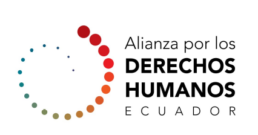
Violaciones de derechos humanos en las protestas del Paro Nacional en Colombia
Después de 43 días de iniciado el Paro Nacional se han retirado los proyectos de reforma de salud y reforma tributaria, renunció el ministro de Hacienda Alberto Carrasquilla y su viceministro, Juan Alberto Londoño, autores de esta última, y, se han dado algunos acercamientos entre sectores movilizados representados por el Comité Nacional del Paro y el Gobierno de Iván Duque para concertar una salida negociada que deberá contener entre otros puntos la intervención económica integral emergente al sistema de la salud, el fortalecimiento de la vacunación contra el coronavirus y la aprobación de una renta básica de emergencia para personas en condición de pobreza. Mientras tanto, se siguen registrando graves violaciones a los derechos humanos en diversas zonas del territorio colombiano, exacerbados por discursos de odio y difamaciones que favorecen la criminalización de las personas y colectivos étnicos que ejercen su derecho a la protesta y movilización social.
Diversas organizaciones de derechos humanos reportan que desde el inicio del Paro Nacional el 28 de abril, hasta el 4 de junio de 2021 han ocurrido: 77 homicidios, de los cuales 34 fueron cometidos presuntamente por el accionar de la fuerza pública, los demás fueron realizados por “civiles” sin identificar en el marco de la protesta social pacífica, o no se tiene información clara sobre ello; 1.246 personas fueron heridas por el accionar desproporcionado de la Policía Nacional, en particular por los Escuadrones Móviles Antidisturbios de la Policía Nacional (ESMAD); 158 personas defensoras de derechos humanos, 667 mujeres han sido víctimas de violencias policiales, 2.808 personas han sido detenidas, muchas de ellas de manera arbitraria aplicando de manera generalizada, indiscriminada y sin justa causa la figura del traslado por protección, siendo sometidas en muchos casos a tortura y/o tratos crueles, inhumanos y degradantes, 346 personas se encuentran desaparecidas; entre otras gravísimas violaciones a derechos humanos.
Estas cifras no son consolidadas, porque hasta la fecha no existe un registro cuantitativo claro y contrastado por instituciones como la Defensoría del Pueblo, la Procuraduría General de la Nación, las Personerías Municipales y la Fiscalía General de la Nación, mostrando, entre otros hechos, gravísimas falencias para procesos de documentación, investigación y atención de las violaciones descritas.
Los hechos reportados se ven exacerbadas por discursos y afirmaciones discriminatorias y de odio realizadas por funcionarios públicos en contra los/las manifestantes, sin ninguna prueba contundente de tales afirmaciones, favoreciendo la construcción de enemigo interno en quienes pretenden hacer pasar estas graves violaciones a derechos humanos como casos aislados de criminalidad o vandalismo entre particulares, omitiendo así su responsabilidad en el discurso público. Es el caso de Wilson Ruiz, Ministro de Justicia, quien durante una entrevista aseguró que la mayoría de los muertos en el contexto de las protestas en realidad ocurrieron en “peleas callejeras o intentos de robo”.
Por otro lado, el Gobierno Nacional haciendo uso velado de figuras contrarias a la constitución como es la “asistencia militar”, indicó a las administraciones departamentales y municipales a través del Decreto 575 expedido el 29 de mayo de 2021, que debía darse una respuesta armada con el Ejército para disolver las manifestaciones en las ciudades, legitimando dar a la población civil un tratamiento similar al de combatientes.
Condena internacional por el uso de fuerza excesiva
El 14 de mayo pasado, expertos en derechos humanos de Naciones Unidas y de la Organización de Estados Americanos condenaron la violenta represión de las protestas pacíficas en Colombia y pidieron al Gobierno una investigación exhaustiva e independiente sobre muertes reportadas, violencia sexual, alegaciones de tortura, casos de presuntas detenciones arbitrarias y de desaparición forzada. Para esa fecha los expertos tenían en sus manos informes de al menos 26 muertes, en su mayoría jóvenes, 1.876 casos de violencia policial, 216 casos de lesiones, incluyendo a policías, aproximadamente 168 desapariciones, 963 detenciones presuntamente arbitrarias, al menos 12 casos de violencia sexual, así como alegaciones de tortura. Además, se habían producido por lo menos 69 agresiones contra defensores de derechos humanos.
Diversas organizaciones, observadores internacionales y periodistas han registrado numerosas denuncias de los voluntarios de atención sanitaria y defensores y defensoras de Derechos Humanos y medios de prensa independiente, que pese a estar formal y correctamente identificados fueron atacados por el ESMAD o por civiles armados obstruyendo su labor y poniendo en grave riesgo su integridad; el incremento de agresiones contra estos colectivos quienes realizan acciones permanentes monitoreo, acompañamiento, asistencia y/o verificación constituye riesgos contra su vida y desconoce su papel para la garantía del derecho a la protesta y del Estado de derecho.
Por su parte la Alta Comisionada de las Naciones, Michelle Bachelet, ha expresado su profunda preocupación por los hechos acaecidos en Cali donde civiles armados han abierto fuego contra manifestantes, periodistas que cubrían las protestas y transeúntes. Cali, capital del Valle del Cauca, es la tercera ciudad más grande de Colombia, con 2,2 millones de habitantes con un alto número de residentes afrodescendientes, ha sufrido hasta 46 homicidios además de diversos ataques de odio contra la Minga indígena que entró en la ciudad a principios de mayo para sumarse a las manifestaciones. “Las autoridades colombianas deben respetar la libertad de expresión y de prensa, y garantizar que los periodistas puedan cubrir las noticias en condiciones de seguridad”. El uso de la fuerza potencialmente letal es una medida extrema, a la que sólo se puede recurrir cuando sea estrictamente necesario para proteger la vida o evitar lesiones graves ante una amenaza inminente. Las armas menos letales, por el contrario, deben emplearse únicamente sujetas a requisitos estrictos de necesidad y proporcionalidad, cuando las medidas menos dañinas resultan ineficaces.
Cali, epicentro de las protestas
En este punto resulta importante referir el contexto socio económico en Cali para entender por qué es uno de los epicentros de la protesta. Cali llegó a ser la ciudad más desarrollada en el suroccidente colombiano, aportando más de 12% del Producto Interno Bruto del país en la década de los 80. Esas condiciones, otrora favorables, configuraron a Cali como epicentro del desplazamiento forzado de miles de personas víctimas del conflicto armado. Solo en 2018 la alcaldía municipal reportó la llegada de 205,000 personas en esta condición, muchos del Pacífico y el Cauca, donde se concentraron los asesinatos de líderes y lideresas sociales, la disputa de las rutas del narcotráfico y la concentración de tierras y territorios ancestrales en manos de la agroindustria azucarera y de biocombustible.
Para el 2020 la situación de pobreza y desempleo en Cali era menos mala que la del resto del país, con una tasa de pobreza del 21,9%, frente al 35,7% nacional; en pobreza extrema los porcentajes eran 4,7% y 9,6% respectivamente, y en el índice de desigualdad 0,46% y 0,52%, con la llegada de la pandemia la pobreza nacional llegó a 42,5 (un aumento de 7 puntos) y 3,5 millones de personas se volvieron pobres (un aumento del 20%). También se incrementó la desigualdad medida por el índice de Gini, el cual pasó de 0,52 a 0,54, volviendo a los niveles de principios de siglo. En Cali la tasa de pobreza aumentó 15 puntos (el doble de la nacional) llegando a 36,3, y el número de pobres aumentó 67%, es decir más del triple de lo que pasó en el país. Otro indicador alarmante en la ciudad es la pérdida de ingresos de los más pobres: mientras que en el conjunto del país fue del 24%, en Cali fue del 50%.
Continuando con el contexto del país el pasado 28 de mayo, el presidente Iván Duque a través del Ministerio del Interior expidió el Decreto 575 de 2021, “por el cual se imparten instrucciones para la conservación y restablecimiento del orden público” en ocho departamentos y trece ciudades del país, disponiendo que alcaldes y gobernadores levanten los bloqueos con el apoyo del Ejército, amparados bajo la figura de la “asistencia militar”, decisión contraria a las disposiciones constitucionales que reconocen y protegen libertades fundamentales como el derecho a la protesta y que ha agravado significativamente posibilidad de concertación manifestantes privilegiando la represión sobre el diálogo. Este decreto impone de facto la figura de la asistencia militar, evitando decretar el estado de conmoción interior que exigiría el control de la Corte Constitucional. Este mismo día habitantes del Municipio de Buga, Barrio Aures, denunciaron que el ESMAD habría ingresado al barrio y desaparecido al menos a 5 personas, en el punto de resistencia de Meléndez en la ciudad de Cali fue asesinado el joven Sebastián Jacanamejoy del Pueblo Inga y herido de gravedad Isan David Imbachi del pueblo Yanacona.
Abusos de derechos humanos bajo investigación
Todos estos hechos y la falta consistente de garantías al derecho a la protesta motivaron insistentes y diversos pedidos ciudadanos a la CIDH para la realización de una visita in loco en la que se puedan documentar en terreno las denuncias de las víctimas y procesos organizativos afectados, identificando impactos diferenciados de las violencias en mujeres, personas LGBT, defensoras de derechos humanos y periodistas, así como comunidades étnicas; después de varias dilaciones por parte del Gobierno de Duque en cabeza de su canciller Marta Lucía Ramírez finalmente se encuentra realizando la visita entre el 8 al 10 de junio.
Si bien la visita es una oportunidad para evidenciar lo ocurrido en contexto de protesta y movilización social en Colombia, generar espacios de diálogo e interlocución y pensar en soluciones de corto y mediano plazo a los problemas evidenciados por las protestas diversas organizaciones sociales, étnicas y de derechos humanos han denunciado que no existen garantías suficientes para que la visita se realice sin limitaciones para el acceso del personal de la comisión a los testigos y a los territorios. La CIDH ha manifestado su interés de escuchar a las víctimas de violaciones a los derechos humanos y sus familiares para recibir sus testimonios, denuncias y comunicaciones; así como a personas que resultaron afectadas por acciones de violencia en ese contexto, para tal fin además de la información que recaben en la visita han diseñado un formulario para que las víctimas puedan compartir sus testimonios. Organizaciones sociales y de derechos humanos requieren a la CIDH impulse la conformación de un grupo de personas expertas independientes como el que acordó frente a las protestas en Nicaragua, Bolivia o Ayotzinapa, México.
El mismo llamado por parte de la sociedad civil colombiana de apoyo se ha extendido a organizaciones internacionales a quienes nos piden continuar la labor de observancia, denuncia y acompañamiento a los sectores sociales y pueblos étnicos movilizados, con el fin de vigilar las obligaciones que el Estado Colombiano tiene para la efectiva garantía del ejercicio de los Derechos Humanos y especialmente, para preservar la vida e integridad ante el escalonamiento de vulneraciones a derechos humanos y la respuesta militar a la protesta social.
El Movimiento Indígena En Pie de Lucha
La Minga indígena a nivel nacional sigue participando activamente del paro, marchas, plantones, puntos de resistencia, corredores de vida, tulpas, mingas locales, actos de recuperación de la memoria, asambleas, mesas de discusión, manifestaciones culturales son algunas de las acciones; en varios comunicados y pronunciamientos rechazan la desigualdad y las reformas y leyes que la profundizan el empobrecimiento estructural que los afecta, denuncian el incumplimiento a los Acuerdo de Paz, el fortalecimiento del paramilitarismo y el narcotráfico y de la subyacente economía ilegal que empobrece al país y que junto con el extractivismo, afecta sus territorios; “bajo el mandato de la Ley de Gobierno Propio Pacto para Volver al Origen, que nos indica que en tiempos aciagos hay que reforzar nuestras luchas por la pervivencia ejerciendo la autonomía con decisión, para asumir nuestra responsabilidad histórica, ética y política en la protección de la vida, la dignidad y la libertad, hasta que se apague el sol.”
Los indígenas en Colombia representan un 5% de la población, según cifras del fondo de Desarrollo para Asuntos Indígenas 1,37 millones de los indígenas del país están en la extrema pobreza, el triple que el promedio nacional. El 70% de los niños y niñas indígenas sufren desnutrición crónica y el 63% del total de la población está bajo la línea de pobreza, de los cuales el 47 % están por debajo de la línea de la miseria extrema. Según las cifras de las ONU, más de la tercera parte de los pueblos indígenas se encuentran en peligro de desaparecer por el hambre extrema, por su parte la más alta Corte del país ha declarado que de los más de 102 pueblos indígenas del país, 34 están en grave riesgo de exerminio físico y cultural.
La Minga Indígena ha confrontado y se ha movilizado activamente contra los gobiernos de Álvaro Uribe y ahora de su aliado político, actual Presidente de Colombia Iván Duque Márquez. Por años, ha sostenido de manera coherente una agenda en defensa de la vida, los derechos humanos, los territorios y la paz, haciendo resistencia a un modelo económico capitalista que empobrece a las comunidades y es contrario con sus planes de vida, cultura y espiritualidad.
Ahora bien, mientras las Guardias indígenas, cimarronas y campesinas se mantienen activas y movilizadas en el Paro Nacional, en los territorios rurales se mantienen las diversas violencias que ejercen actores armados irregulares y estatales. Por poner un ejemplo, el viernes 4 de junio en horas de la mañana se presentó un ataque armado en contra de miembros de la Policía Nacional en el sector conocido como “La Vuelta de la Mama” en el casco urbano de Santander de Quilichao, departamento del Cauca. Al momento del ataque se desplazaban varios comuneros indígenas en un vehículo de transporte público tipo Jeep por la vía que comunica el casco urbano con la vereda San Pedro y quedaron atrapados en el intercambio de disparos. Como resultado hay tres personas asesinadas: en el hecho, una mujer de 54 años y un joven de 21 años, autoridad u’kawe’sx del Resguardo de Munchique los Tigres y tres días después, la comunicadora comunitaria del Tejido de comunicación Çxhab Wala Kiwe de la Asociación de Cabildos Indígenas del Norte del Cauca, Beatriz Cano. En la madrugada de hoy, 9 de junio, la autoridad indígena del pueblo Nasa Argenis Yatacue y su esposo fueron asesinados también en la entrada del municipio Corinto en el Cauca.
No existe diálogo o acuerdo posible mientras en los territorios se sigue amenazando, hostigando y asesinando a personas defensoras de derechos humanos, quienes han sostenido la lucha de los pueblos a través de la primera línea, la Guardia indígena, la Minga comunitaria, quienes no solo enfrentan amenazas contra su vida en el contexto del Paro Nacional y de pandemia, sino que viven múltiples vulneraciones históricas a sus derechos humanos y colectivos. No es posible que al mismo tiempo que se abre una mesa de concertación, también se esté autorizando a la fuerza militar a frenar las protestas y legítimas movilizaciones porque este es un derecho legítimo del pueblo colombia amparado tanto por la Constitución, la jurisprudencia (sentencia C-742/12) y la Convención Americana sobre DDHH (art. 15) .
Tampoco es posible hablar de diálogo, sin que el Estado de Colombia admita, reconozca y se comprometa a investigar las violaciones sistemáticas e históricas a los derechos humanos, y sin que al menos el Presidente realice un pronunciamiento público y contundente ofreciendo la investigación independiente de los hechos denunciados internacionalmente. Esperamos que la CIDH escuche a las víctimas y documente de forma amplia las violaciones a los derechos humanos cometidas durante el Paro Nacional, sin que agentes estatales manipulen e impidan la realización de su trabajo, y que una vez sean emitidas y de público conocimiento las recomendaciones, estas sean de obligatorio e inmediato cumplimiento.
¡A parar para avanzar, viva el Paro Nacional!
Lea la Parte I del análisis aquí.
Escrito por:
Maria Espinosa & Laura Rojas Escobar
Abogadas del Equipo Legal de Amazon Frontlines
Fotos Cortesia del Consejo Regional Indígena del Cauca CRIC
Civil Society to the United Nations Development Programme: Sever Ties to the Oil Industry

New York, NY—Prompted by the recent alliance in Colombia between the United Nations Development Programme (UNDP) and GeoPark, an oil company credibly accused of human rights and environmental malfeasance in the Amazon rainforest, an international group of more than forty organizations wrote to the UNDP Executive Board on Friday, June 4. The letter called on it to sever all ties with the fossil fuel industry and to use this week’s annual meeting to stop any ongoing and future collaboration with the fossil fuel industry.
The signatories noted that in the GeoPark case, the UNDP clearly failed in its due diligence and contradicted its own “Standard 6” for enacting projects. In general, UNDP’s fossil fuel alliances contradict the urgent need to rapidly transition away from fossil fuels to avoid catastrophic climate change. In the letter, the signatories posed three questions to the UNDP.
“Business-as-usual for fossil fuel companies is contrary to UNDP’s Sustainable Development Goals and the findings of the Intergovernmental Panel on Climate Change,” said Carlos Salinas, Executive Director of Healing Bridges, adding that “Both U.N. Secretary General Guterres and the International Energy Agency’s report on Net Zero by 2050 made this clear.”
The UNDP-GeoPark alliance was immediately denounced by the Buenavista Reservation of the Siona People and ADISPA campesino community in the Amazonian Department of Putumayo. Mario Erazo, a Siona Indigenous leader said, “Extractive industries are not in line with sustainable development or the wellbeing of the ZioBain (Siona) or other Indigenous Peoples. By aligning itself with companies like GeoPark, UNDP is disregarding Indigenous rights and governance in favor of the myth of sustainable and socially responsible extractivism. UNDP’s agreements with oil companies cause nothing but harm to Indigenous Peoples.”
A civil society campaign led by affected communities and a biting recommendation by the UN Permanent Forum on Indigenous Issues forced UNDP-Colombia to cancel the alliance. A number of organizations pointed out, however: “The trust, the legitimacy, and the respect that the civil society organizations had placed in the United Nations System and particularly in the UNDP was deeply fractured.”
“GeoPark is not the only oil company attempting to launder its image with the UNDP’s imprimatur – the agency also has a global collaboration with Repsol. Although UNDP’s due diligence policy to work with the private sector excludes some industries from consideration, oil and gas are still in the mix. We say no more: the UNDP must stop blue-washing fossil fuels,” said Andrew Miller, Advocacy Director of Amazon Watch.
Contact:
Andrew Miller, Amazon Watch at +1-202-423-4828 or andrew@amazonwatch.org
Sophie Pinchetti, Amazon Frontlines at +593 98148 4873 or sophie@amazonfrontlines.org
Carlos Salinas, Healing Bridges at +1-202-230-1077 or healingbridgesdc@gmail.com
Human Rights Violations Mount in Colombia’s Protests
Widespread protests are now entering their third week in Colombia as the country grapples with a third wave of COVID-19 that has brought a collapsed health care system in the main cities of the country, new travel restrictions, curfews and the precarious implementation of a national vaccination program coordinated through the bilateral COVAX scheme.
As part of the national demonstrations sweeping the country, Indigenous peoples have organized a minga or march to demand respect for rights that have been historically denied to them. Indigenous peoples in Colombia face recurrent racism and stigmatization, and communities continue to suffer systematic violence and the dispossession of their ancestral territories. Colombia is home to 102 Indigenous peoples, of which thirty-nine have been declared at imminent risk of physical and cultural extermination as a consequence of the internal armed conflict and thirty-five of which face a high risk due to their demographic decline with less than 200 inhabitants. In addition, 242 indigenous leaders have been assassinated since the signing of the Peace Accords in 2016.
As part of the protests, the Indigenous movement has put forward an agenda with several key demands: justice for the impacts of violence caused by the armed-conflict and narco-trade, structural impoverishment, and the threat of dispossession of their ancestral territories; as well as respect for their fundamental rights as victims of the armed conflict; the recognition and affirmation of their autonomy and decision to remain in their territories as an essential condition to guarantee their survival; the State’s flagrant non-compliance with the Peace Accords; stopping the imminent reactivation of dangerous aerial spraying of coca-crops with glyphosate (otherwise known as Round-Up); the imposition of development models opposing the Indigenous philosophy of “Buen Vivir” (Good Living); and the violation of rights to self-determination and prior, free and informed consultation and consent.
Additionally, the Indigenous guardias, whose existence and work are synonymous with resistance, peace, collective struggle, and the real and effective protection of their communities and territories, have joined the frontlines of mobilizations in cities alongside young demonstrators protesting against unemployment, inequality and the consequences of forced displacement and poverty in the cities.
It is important to consider that the systems of guardia are autonomous strategies of resistance for the monitoring and control of Indigenous territories (with or without formal titles). They are a manifestation of legal pluralism, of proper law, of self-determination for the support and backing of the traditional, political and spiritual authorities of each Indigenous people. They are civil, peaceful bodies, which have the main function of caring for and defending life and culture. Today, they are mobilizing in the cities as a result of their communities’ mandate in an effort to denounce the deepening war in their territory, rising inequality and the socio-environmental effects and systematic violations of their human and collective rights.
Demands for the government to build a fairer society have been met with police brutality and repression. Despite the existence of national and international normative tools to regulate the use of force by Colombia’s Mobile Anti-Disturbances Squadron (ESMAD) and the police force in the context of protests, serious human rights violations have been reported since the start of demonstrations at the end of April.
According to the “Defend Freedom Campaign” (Campaña Defender la Libertad), as of May 15th, 2021, 49 people have been killed at the hands of alleged unidentified state and/or “civil” actors; one young minor decided to end his life after being sexually assaulted by the public force; 578 have been injured in clashes between the national police and ESMAD; 37 have suffered vision loss; 87 have been victims of gender-based violence. At least 1,460 people have been arrested, some of whom have also denounced acts of torture and other cruel, inhuman, degrading treatment while in custody. Twelve raids have also been made, eight of which have been declared illegal, including arrests of human rights defenders. To date, at least 379 people have been reported as missing, and this figure is subject to review. The crisis in the country continues despite growing national and international condemnation of the militarized response and police repression against demonstrators.
Adding to popular outrage against these abuses, militarization, and killings, impoverished families throughout the country have been asking for but have not received an urgent basic income since the beginning of the pandemic in 2020 in order to survive the lockdown. 42.5% of Colombia’s population is already living in poverty, of which 15.1% is now living in extreme poverty. Alarming inequality continues to grow between the countryside and cities, a product of, among other things, the ongoing internal armed conflict. For the past sixty years, the armed conflict has claimed seven million victims, and adequate reparations or considerations have still not been made.
At the beginning of the national strike on 28th April, 2021, protestors marched in the streets with banners declaring that they feared the criminal right-wing government more than COVID-19 itself. At that time, the government was attempting to promote a controversial tax reform bill, which detonated social discontent. The reform would have seen taxes imposed on basic family goods and necessities, retirements and extra taxes on the middle class with hopes of curbing the country’s budget deficit. Yet the salary of a congressman (valued at $ 34,417,000 COP) is equal to 48 monthly minimum wages, showing again the stark inequality in the country.
Even as the Minister of Finance resigned on the sixth day of protests, demonstrations continued and intensified. Protestors’ opposition to the privatization of healthcare and demands for a quality, free and universal education; and for the respect of life, dignity and territories were met with brutal repression, police brutality and abuses from the public force.
We at Amazon Frontlines express our deep concern over the Colombian government’s declarations that protestors have “terrorist” objectives, thereby justifying their excessive use of force against the population. We also express concern over the declarations of local authorities inciting civilians to rise up against the protestors, a clear signal to paramilitary militia groups with a long history of devastating violence in Colombia. This is not only a violation of human rights standards, but it is also an assault on all the victims of paramilitary violence in a country that has suffered the longest internal armed conflict on the continent.
Hate speech has been especially promoted by high-level officials such as the Minister of Defense, Diego Molano; mayors, like Carlos Maya, mayor of the city of Pereira,; and influential public figures such as former President Álvaro Uribe Vélez, who today runs the ruling political party. These figures have made statements which intentionally, consciously and voluntarily seek to project a biased image of the demonstrations and set fire to public demonstrations with a defense for ongoing genocide. These statements have sought to encourage members of the police force and civilians to act out against protestors, resulting in an alarming increase in the use of institutional violence, directly exercised by uniformed or undercover law enforcement officers and through the actions of individuals who have had the complicity or acquiescence of the State.
The arbitrary, violent and disproportionate actions of ESMAD and military forces go against the protocols, norms and international human rights standards relating to the use of public force in the context of peaceful social protest. The violence responds to a scenario of fear, confrontation and discrimination, and an attempt to impose a concept of security based on the fear of certain privileged sectors of the population, thereby justifying the repressive treatment of protests.
Growing concern over the increasingly violent events has been publicly denounced by various human rights organizations in Colombia and the international community, including the Inter-American Commission on Human Rights (IACHR) and its Office of the Special Rapporteur for Freedom of Expression, which have expressed “concern about stigmatizing and intimidating statements by state authorities, among which are particularly worrying those that classify protesters and victims as ‘terrorists’, ‘enemies’ or ‘criminals’. Declarations of concern have also been made by the Office of the United Nations’ High Commissioner for Human Rights, and more than 650 Civil Society Organizations from around the world.
Despite the fact that social mobilization and peaceful protest is a political right that, as a pillar of a democratic system, has been explicitly considered as a fundamental part of the Peace Accords, since April 28th this guarantee has been completely breached by the Government of Colombia. Brutal armed repression, judicial persecutions, attempts to quash protests through road blockades and the State’s ignorance of the structural demands of civil society have fueled unrest and deepened a critical situation for human rights in the country.
In recent days, the south of the country has been the protagonist of both barbarism and hope. Cities such as Cali, Popayán, Yumbo and Bogotá have been the epicenter of attacks against peaceful mobilizations. The Indigenous Minga and members of the Indigenous guardia of the Regional Indigenous Council of Cauca (CRIC) have accompanied these mobilizations and documented protest through social media and alternative press, revealing evidence of armed attacks against protestors, sabotage by public forces and violent interception by armed third parties, and even the successful arrest and disarmament of members of the national police infiltrating the marches.
In the Putumayo region, the Siona people of Buenavista, a cross-border community whose territory is located along the Putumayo River between Colombia and Ecuador, has mobilized its traditional and political authorities and its indigenous guardia to peacefully participate in the national strike in the municipality of Puerto Asís, demanding respect for the Amazon; denouncing the impacts that continue without remediation as a result of fumigations with glyphosate and the risk posed by the resumption of what is essentially chemical war against the civilian population; the imminent physical and cultural extermination in which they find themselves; the pressure for the development of oil activity in the region and the lack of progress in the processes of restitution and territorial formalization.
With dignity, strength and courage, men and women of Indigenous peoples, the labor sector, young people, students and farmers have risen up to demand their right to peaceful protest and to try to build, through de facto means, a country that continues to resist armed violence and paramilitarism. As they sing in the streets: “¡El pueblo no se rinde carajo!” (“The people don’t give up! Damn it!”). Civil society in Colombia has grown tired of allowing oppression and injustice to go on unchecked.
May the wisdom of Indigenous peoples allow us to find paths toward a dialogue for transformation. May the serious violations of human rights being committed come to a stop immediately, and multilateral organizations and special international verification missions accompany the ongoing protests and the recent events that have prompted the mobilization.
Written by:
Maria Espinosa & Laura Rojas Escobar
Lawyers from Amazon Frontlines’ Legal Team
Violaciones de derechos humanos en las protestas de Colombia
El Paro Nacional en Colombia cumple 21 días de movilizaciones populares, en pleno pico de la tercera ola del Covid-19, en un contexto previo de colapso de las unidades de emergencia hospitalaria en las principales ciudades del país, el reinicio de medidas de restricción de circulación, toques de queda y una precaria implementación del plan nacional de vacunación que comenzó el 17 de febrero con dosis adquiridas a través del mecanismo bilateral del COVAX y no la gestión directa del Gobierno Nacional.
A la fecha, el país afronta la imposición de un recurrente y sistemático discurso de odio racista y estigmatización contra los Pueblos indígenas movilizados bajo la figura de la Minga que camina la palabra y recorre el País para exigir sus derechos; esos que históricamente les han sido negados, pues las comunidades siguen sometidas a la sistematicidad de la violencia y el despojo de sus territorios. Acercando la realidad a las cifras, de los más de 102 Pueblos Indígenas que existen el Colombia, al menos 39 están declarados en inminente riesgo de exterminio físico y cultural como consecuencia del conflicto armado interno; 35 enfrentan alto riesgo por disminución demográfica contando con menos de 200 habitantes; y 242 líderes indígenas asesinados desde la firma de los Acuerdos de Paz en 2016.
Los impactos de la violencia, el empobrecimiento estructural, la amenaza de despojo de sus territorios ancestrales, la búsqueda de satisfacción de sus derechos fundamentales como víctimas del conflicto armado, la afirmación de su autonomía y la decisión de permanecer en sus territorios como condición esencial para garantizar su pervivencia, el incumplimiento flagrante a los Acuerdos de Paz, la inminente reactivación de las fumigaciones aéreas con el glifosato, la imposición de modelos de desarrollo contrarias al Buen Vivir, el desconocimiento de la libre determinación y consulta y consentimiento previa, libre e informada, son algunos de los ejes centrales en la agenda del Movimiento Indígena cuyos incumplimientos son motivos suficientes para sumarse al Paro Nacional.
Adicionalmente, las Guardias Indígenas, sinónimos de resistencia, de paz, de lucha colectiva, de protección real y efectiva a los comuneros y los territorios, han salido a rodear las primeras líneas de las movilizaciones populares en las ciudades que están compuestas mayoritariamente por jóvenes que, sin oportunidades de empleo ni educación, hijos de una generación que afrontó las consecuencias del desplazamiento forzado y el engrosamiento de los cordones de miseria en las urbes, reclaman con furia al Estado la construcción de un país más justo mientras la Policía les dispara a mansalva.
Es importante considerar que los sistemas propios de guardianía son estrategias autónomas de resistencia para el monitoreo y control de los territorios étnicos (formalizados o no), y son una manifestación del pluralismo jurídico, del derecho propio, de la libre determinación para el apoyo y respaldo de las autoridades tradicionales, políticas y espirituales de cada Pueblo Indígena. Son cuerpos civiles, pacíficos, con una función principal de cuidado y defensa de la vida y la cultura, que hoy se trasladan hacia las ciudades por mandato Asambleario y acogida del movimiento social para visibilizar el recrudecimiento de la guerra en los territorios, el incremento de condiciones de desigualdad, y las afectaciones socio ambientales y de vulneración sistemática de sus derechos humanos y colectivos.
Pese a la existencia de las herramientas normativas nacionales e internacionales para regular el uso de la fuerza del Escuadrón Móvil Antidisturbios (ESMAD) y de la Policía en los escenarios de protesta, se han presentado graves violaciones de derechos humanos en las jornadas de movilización del Paro nacional. Con corte al 15 de mayo, el país tiene un saldo de graves violaciones de derechos humanos que según la Campaña Defender la Libertad, deja 49 personas asesinadas en manos de presuntos actores estatales y/o “civiles” sin identificar y una joven menor de edad quien decidió acabar con su vida luego de las agresiones sexuales ejercidas por la fuerza pública; 578 heridos en enfrentamientos de la Policía Nacional y el ESMAD-, 37 personas con pérdida ocular, 87 víctimas de violencias basadas en género, 1460 detenciones, con algunas denuncias de tortura y sometimiento de tratos crueles, inhumanos y degradantes; 12 allanamientos de los cuales 8 han sido declarados ilegales, incluyendo capturas a defensores de ddhh; y un registro de 379 personas desaparecidas. Esta última cifra se encuentra en proceso de verificación y actualización. Todos estos hechos se mantienen a pesar de la creciente condena nacional e internacional sobre la respuesta militarizada y represión policial de manifestaciones.
A la indignación popular por la respuesta de abusos, militarización, y muerte, se suma que, desde el comienzo de la pandemia en 2020, con pañuelos rojos amarrados en las ventanas, familias empobrecidas en todo el territorio nacional pedían que se decretara renta básica urgente para hacer sostenible el encierro. En medio de tanta precarización, con un 42.5% del país en los límites de pobreza -de los cuales el 15.1% se encuentra en pobreza extrema-, sin garantías de educación, con universidades públicas desfinanciadas, y unas brechas de desigualdad entre el campo y la ciudad en niveles alarmantes producto, entre otras cosas, del conflicto armado interno que lleva 60 años poniendo más de 7 millones de víctimas sin reparación ni consideración alguna, las personas perdieron tanto, que se quedaron sin miedo. Las pancartas del día 28 de abril, fecha en la que comenzó el Paro Nacional, señalaban que más que al COVID las personas temían a un Gobierno de Derecha criminal, el cual estaba intentando promover con unánime respaldo del Congreso de la República una reforma tributaria para entre otros, gravar elementos de la canasta básica familiar, pensiones de vejez, y financiar con impuestos a la clase media un déficit fiscal que detonó el descontento social, teniendo en cuenta que con el salario de un congresista (valorado en $34’417.000 COP), se pagan 48 salarios mínimos mensuales vigentes.
Aún con la renuncia del Ministro de Hacienda al sexto día de las movilizaciones el Paro continua como un estallido social, producto del rechazo absoluto a la represión exagerada de las manifestaciones, abusos de la fuerza pública y brutalidad policial, el curso de una reforma a la salud que privatiza aún más este derecho en medio de una pandemia, a las exigencias de educación universal, gratuita y de calidad, y al respeto mínimo por la vida, la dignidad y los territorios.
Desde nuestra organización expresamos preocupación por el hecho de que autoridades del gobierno nacional hayan declarado públicamente que las manifestaciones tienen fines “terroristas” y que, por esta razón, se justifique el uso excesivo de la fuerza contra la población. Además, las declaraciones de autoridades locales llamando a civiles a levantarse con el animo de justificar la utilización de estrategias paramilitares contra los marchantes. Esto no solamente es violatorio de los estándares de derechos humanos, sino es una afrenta a todas las víctimas de grupos paramilitares en un país que tiene el conflicto armado interno más largo del continente. El discurso de odio ha sido especialmente promovido por funcionarios de alto nivel como el Ministro de Defensa, Diego Molano; alcaldes, como el de Pereira, Carlos Maya; e influyentes figuras públicas como Álvaro Uribe Vélez, ex presidente que hoy regenta el partido de Gobierno; quienes realizado declaraciones con las que buscan, de manera intencionada, consciente y voluntaria, proyectar una imagen parcializada de las manifestaciones, incendian con apología al genocidio las manifestaciones ciudadanas. Con ello, se ha pretendido alentar, tanto a los miembros de la fuerza pública como a ciudadanos, a que actúen contra las personas que se manifiestan, lo que ha traído como consecuencia un alarmante incremento en el uso de la violencia institucional, ejercida directamente por agentes de la fuerza pública uniformados o encubiertos y mediante la actuación de particulares que han contado con la complicidad o aquiescencia del Estado.
Las actuaciones arbitrarias, violentas y desproporcionadas del ESMAD y las Fuerzas Militares, contrarias a protocolos, normas y estándares internacionales de derechos humanos sobre el accionar de la fuerza pública en contextos de protesta social pacífica responden a un escenario de miedo, confrontación y promoción de discursos de discriminación y odio que pretende imponer una concepción de seguridad fundamentada en el miedo generalizado de ciertos sectores privilegiados de la población y que justifica el tratamiento represivo de la protesta.
La preocupación por los hechos violentos que se han desencadenado producto de dichas declaraciones ha sido denunciada públicamente por diversas organizaciones de derechos humanos en Colombia y respaldada por la Comisión Interamericana de Derechos Humanos y su Relatoría Especial para la Libertad de Expresión, quien ha expresado “su preocupación ante declaraciones estigmatizantes e intimidatorias por parte de las autoridades estatales, entre las cuales resultan particularmente preocupantes aquellas que califican a los manifestantes y a las víctimas como “terroristas”, “enemigos” o “delincuentes”
Pese a que la movilización social y la protesta pacífica es un derecho político que, como pilar de un sistema democrático, se había contemplado explícitamente como parte fundamental de los Acuerdos de Paz, desde el 28 de abril esta garantía ha sido absolutamente incumplida por parte del Gobierno de Colombia que, con la brutal represión armada, persecuciones judiciales, bloqueos para su desarrollo y desconocimiento de las exigencias estructurales de la sociedad civil, ha alimentado el malestar popular acrecentando la situación crítica en materia de derechos humanos, que ya está en la mira de la comunidad internacional, con pronunciamientos específicos por parte de la CIDH, la Oficina de la Alta Comisionada de las Naciones Unidas para los Derechos Humanos, y más de 650 Organizaciones de la Sociedad Civil de todo el mundo.
En los últimos días, el sur del país ha sido protagonista tanto de la barbarie como de la esperanza. Ciudades como Cali, Popayán, Yumbo y Bogotá han sido epicentro de los ataques contra las movilizaciones pacíficas, las cuales habrían estado acompañadas por la Minga Indígena y la Guardia Indígena del Consejo Regional Indígena del Cauca – CRIC, quienes documentan continuamente por redes sociales y prensa alternativa ataques armados en su contra, saboteo por parte de la Fuerza Pública e interceptación violenta por parte de terceros armados, logrando incluso la captura, desarme y entrega al Estado de miembros de la Policía Nacional infiltrados en las marchas.
En el Departamento del Putumayo, el Resguardo Buenavista del Pueblo Siona, comunidad transfronteriza cuyo territorio se encuentra en la rivera del río Putumayo entre Colombia y Ecuador, ha movilizado su guardia indígena para participar, de manera pacífica junto con sus autoridades tradicionales y políticas en el Paro Nacional en el municipio de Puerto Asís y exigir el respeto por la Amazonía, denunciar las afectaciones que siguen sin remediación producto de las fumigaciones con glifosato, el riesgo que supone la reanudación de una guerra química en contra de la población civil, el inminente exterminio físico y cultural en el que se encuentran, la presión por el desarrollo de la actividad petrolera en la región y la falta de avance de los procesos de restitución y formalización territorial.
Con dignidad, fuerza y valentía, hombres y mujeres de los pueblos indígenas, del sector obrero, jóvenes, estudiantes y campesinos salen a exigir su derecho a la protesta pacífica y a tratar de construir, por las vías de hecho, un país que continúa resistiendo a la violencia armada y al paramilitarismo. Como cantan en las calles, ¡El pueblo no se rinde carajo! Y menos si la ciudadanía se cansó de permitir la opresión y la injusticia. Que la sabiduría milenaria de los pueblos originales permita encontrar caminos de diálogo para la transformación, se frene de manera inmediata las graves violaciones de los derechos humanos y se acompañe por parte de organismos multilaterales, a través de misiones especiales de verificación internacional en Colombia, los hechos recientes que han impulsado la movilización.
Escrito por:
Maria Espinosa & Laura Rojas Escobar
Abogadas del Equipo Legal de Amazon Frontlines
The Buenavista Reservation of the Siona People and civil society human rights organizations celebrate the cancellation of the "Strategic Alliance" between UNDP-Colombia and GeoPark oil company
On April 26, the Buenavista Reservation of the Siona People and the Association for Holistic Sustainable Development, Perla Amazónica, ADISPA, publicly denounced the launching of a “Strategic Alliance” between the United Nations Development Program (UNDP) and the oil company GeoPark, denouncing that the UNDP did not hold consultations with the campesino and indigenous communities and organizations impacted by the extractive activity carried out by this oil company, and that the UNDP did not take into account the processes of territorial defense and resistance against extractive industries that both community organizations have been enduring for years in the municipality of Puerto Asís, Putumayo, Colombia.
Responding to this complaint, Jessica Faieta, the Resident Representative of the United Nations System in Colombia wrote on April 28 and proposed a meeting with the organizations to detail the UNDP’s interest in developing the project of territorial economic reactivation in partnership with private actors – such as the oil company GeoPark – in the context of the Covid-19 pandemic. In her letter, she further stated that “In accordance with the principles that characterize UNDP actions, such as impartiality, transparency, and building trust, we have decided to suspend the activities of this project in the municipality of Puerto Asís to learn more about your concerns and to share with you the scope of UNDP’s actions envisioned for the territory.”
The meeting was held virtually on April 29, with the participation of the leaders of the Buenavista Reservation and ADISPA and the accompaniment of the civil society organizations jointly subscribing to this release. The UNDP’s principal interlocutor, Jessica Faieta, tried to justify, in a regrettable way, the actions carried out to attract resources from private companies, in a clear omission of the minimum criteria for corporate ethics and due diligence.
Under the Sustainable Development agenda, UNDP signed an alliance with GeoPark that favored its corporate image and made it easier for the company to whitewash its responsibility for the historical violation of human, collective, environmental, and territorial rights in the precarious contexts in Colombia. The Chilean oil company GeoPark made a contribution of US$1.7M1 to UNDP, the amount being the criterion that prevailed contrary to international standards and guiding principles for Business and Human Rights2 and the Escazú Agreement, which define the minimum standards for the verification of compliance with the law and respect of human rights by Transnational Companies, with special emphasis on the problems and impacts on communities exposed to greater risks, vulnerabilities, and marginalization due to the specific context of victimization of the internal armed conflict.
We found it unfortunate that Jessica Faieta’s interventions attempted to justify the unjustifiable. She mentioned that the role of the United Nations was to “guarantee, promote, and facilitate” human rights compliance by companies that are already established in the region and to ensure that they, in turn, return “development” to the territories that is “sustainable” for the communities, using as an example alliances in other parts of the country with companies that have had great questions raised about massive human rights violations that have occurred in their zones of influence in the development of mining and energy projects, questions troubling enough that they are even being studied as a case before the Special Jurisdiction for Peace.3
Another controversial point during the meeting was the allusion made by the UNDP representative of her role in guaranteeing the right to prior consultation, which she asserted she could “ensure.” On the one hand, the System of Nations United cannot supplant State functions to try to impose corporate visions favorable to extractive interests in the region at the cost of the struggle and survival of an ancient and ancestral people. The Buenavista Reservation of the Siona People has had to endure the systematic and bad faith infringements of their right to prior consultation by the oil company (today “Nueva Amerisur,” a subsidiary of GeoPark.) Buenavista has publicly reiterated their firm position that they have formalized their lack of agreement with the oil company since 2015, and which clearly expresses their lack of consent for any kind of prospecting, exploration, and exploitation activities for crude oil within its ancestral territory, a position also protected by precautionary decisions of the Court of Land Restitution of Mocoa. On the other hand, several human rights organizations, including Global Witness, have documented the multiple murders of territorial and environmental rights defenders, placing Colombia as the country where the most such cases are presented and documented.4
This integration philosophy promoted by UNDP, through which it seeks to bring together multinational companies that, like GeoPark, do not assume their responsibilities for repairing, remediating, and financing socio-environmental conflicts; with communities in resistance such as the Buenavista Reservation, is disrespectful of the struggle and good faith with which the indigenous community received the “Sustainable Amazon” program, and is incompatible with the program’s stated purposes. One cannot fail to consider that in the Auto 004 of 2009, the Constitutional Court of Colombia identified the extractive sector and its imposition of oil projects by force in the territories to be an underlying factor in the internal armed conflict. The Court also identified the Siona People to be among 34 indigenous peoples at “high risk of cultural or physical extermination.” This is underscored by the statements of irregular armed actors who have publicly supported the same oil development in the municipality of Puerto Asís.
Through a brief statement that has not yet been made public or signed by the Representative, but that came to us from UNDP’s email to the Buenavista Reservation, on 12 May 2021 UNDP reported that it had decided to CANCEL the alliance with the GeoPark oil company, ratifying the commitment “with the indigenous peoples and sustainable development in Colombia.”
We reiterate: it is not enough for UNDP to cancel their activities with the oil company. The trust, the legitimacy, and the respect that the civil society organizations had placed in the United Nations System and particularly in the UNDP was deeply fractured. We see it as a clear sign of bad faith that, despite the fact that the leaders of the Buenavista Reservation had been emphatic both in their written statement and in the oral interventions made in the April 29 meeting that they were not going to continue with the execution of the GRANT until UNDP publicly defined its position regarding the Agreements with Geopark, UNDP disbursed two days later resources for $52,000,000.00 COP to the account of the Tribal Government (Cabildo,) pressing to give continuity and execution of activities that include access to privileged information of the territory whose content we no longer trust would not end up in the hands of the company.
We insist that it is INCOHERENT of UNDP to both seek effective environmental and territorial protection of the Amazon and at the same time reach agreements with the company that has most threatened this fragile ecosystem and that has tried to fragment the organization of communities, to the extent of legally opposing the process of restitution of territorial rights. These are not isolated cases but instead have grave international antecedents such as the pressure on communities and territories of the Wampís and Achuar indigenous peoples in Peru, whose legal actions and resistance led to the discontinuance and withdrawal of the oil company in July 2020 in that country.5 The UNDP must have as PUBLIC a response as the one deployed when the Alliance was launched.
We demand that UNDP speak out publicly on any final decisions it adopts; that GeoPark remove from its website the endorsement, logo, and alliance with the United Nations System in Colombia; and that Jessica Faieta in her capacity as Resident Representative of the United Nations System in Colombia publicly apologize to the Buenavista Reservation for having ignored their struggle to defend life, territory, and dignity, giving preference to interests that pollute the territories, destroy the Amazon, and put at risk the life of the communities.
RESGUARDO BUENAVISTA PUEBLO SIONA
gobernadorbuenavista@gmail.com
AMAZON FRONTLINES
AMAZON WATCH
HEALING BRIDGES
-
See: https://open.undp.org/projects/00132303
-
Resolution 17/4, of 16 June 2011, Human Rights Council of the United Nations.
-
See: “La JEP establece que 2.094 personas fueron víctimas de desaparición forzada en el área de influencia de Hidroituango”, Comunicado 173 of 2020, Bogotá, 9 December 2020. Accessed at: https://www.jep.gov.co/Sala-de-Prensa/Paginas/La-JEP-establece-que-2.094-personas-fueron-v%C3%ADctimas-de-desaparici%C3%B3n-forzada-en-el-%C3%A1rea-de-influencia-de-Hidroituango.aspx
-
https://www.globalwitness.org/en/campaigns/environmental-activists/defending-tomorrow/
-
https://earthrights.org/media/empresa-petrolera-geopark-desistio-de-operar-en-territorios-indigenas-wampis-y- achuar/
Protegiendo territorios y culturas indígenas de la Amazonía en tiempos de pandemia
A principios de abril de 2021, un año después de que la pandemia por Covid azotara a América del Sur -colapsando los sistemas de salud occidentales- y se extendiera incluso hasta las comunidades indígenas más remotas de la Amazonía, nuestros equipos tuvieron una serie de reuniones en nuestro centro de organización conjunta en el norte de la Amazonía ecuatoriana para reflexionar sobre los aprendizajes y experiencias claves del año pasado, y para discutir cómo proteger de manera más efectiva y segura los territorios y culturas indígenas de la crisis, cada vez más profunda e interrelacionada, que enfrentamos: Emergencia climática, pérdida de biodiversidad, intensificación del extractivismo y una inminente segunda de Covid, con picos variables que llegan diariamente desde las ciudades fronterizas por río, carretera y avión.
Este corto video, captura el espíritu de nuestra reunión y fue grabado por dos jóvenes cineastas de la nacionalidad siekopai, quienes también hicieron un impresionante cortometraje para el New Yorker el año pasado, titulado: Luchando contra el Covid con Sabiduría Ancestral en la Amazonía.
La realidad para las comunidades indígenas en la Amazonía, como en otras partes del mundo, es que la pandemia ha agudizado las desigualdades, ha expuesto el racismo sistémico e intensificado las presiones extractivas sobre sus territorios y culturas.
En toda la región, los gobiernos han abandonado a los pueblos indígenas en su lucha contra el Covid-19: el acceso a la información de salud pública, las pruebas y los suministros médicos han sido limitados, y la perspectiva de vacunas para las comunidades indígenas está muy lejos.
En Ecuador, los derrames masivos de petróleo, el aumento de la minería y el auge de la tala ilegal, han agravado la terrible situación. En Colombia, el conflicto armado por el tráfico ilícito de coca ha aumentado los riesgos para los defensores de las tierras indígenas. Y en Brasil, el escalofriante desprecio del gobierno de Bolsonaro por la naturaleza y los derechos de los pueblos indígenas está alimentando la deforestación y aumentando las tasas de mortalidad por Covid.
Organización comunitaria en primera línea
Pero también hay otra realidad menos conocida. A pesar de las múltiples amenazas (el agua contaminada, la marginación, los incendios provocados), los pueblos indígenas de la Amazonía continúan organizando e innovando estrategias para su propia supervivencia física y cultural, y para la protección de casi la mitad del bosque primario que aún queda en la Amazonía.
Estos son solo algunos ejemplos: Asediado por una ola implacable de Covid-19 el año pasado, el pueblo siekopai creó un remedio ancestral, una mezcla de raíces, cortezas, flores y hojas de su tierra ancestral, que se utilizó para fortalecer el sistema inmunológico y tratar los síntomas de Covid-19 en las comunidades indígenas de la Amazonía y los Andes.
El pueblo waorani desafió el racismo del gobierno ecuatoriano y la terrible mala gestión de su respuesta a la pandemia, y sentó un precedente legal y político sobre cómo los gobiernos deben priorizar la atención a los pueblos indígenas durante la pandemia.
La Alianza Ceibo aprovechó relaciones comunitarias profundas y basadas en la confianza, así como los años de experiencia en la gestión de la logística compleja de la selva tropical, para desplegar recursos y suministros médicos, construir infraestructura de comunicaciones y gestionar emergencias de salud pública en millones de hectáreas de territorios indígenas en Ecuador, Colombia y Perú.
Y en toda la Amazonía, los líderes, las comunidades y las instituciones indígenas han estado formando patrullas terrestres y guardias indígenas para monitorear el aumento de las amenazas extractivas y restringir el acceso a sus territorios.
Mientras trabajamos para apoyar a los pueblos indígenas a que enfrenten una nueva ola de medidas hostiles de recuperación económica y la intensificación de las amenazas extractivas en toda la región, nos conmueve e inspira el hecho de que las comunidades de primera línea que demostraron ser más resilientes frente al Covid-19 también fueron los menos afectados por la economía extractiva.
Si bien la distancia geográfica para las comunidades que viven en bosques primarios sin caminos planteó dificultades para su acceso a pruebas y suministros médicos occidentales, estas tuvieron un acceso sólido a recursos de caza y pesca intactos, así como a plantas medicinales tradicionales. Al final, vieron tasas de mortalidad más bajas y menos traumas relacionados con el Covid que aquellas comunidades indígenas que viven en territorios fragmentados e impactados por la industria extractiva.
En Amazon Frontlines y Alianza Ceibo, estamos trabajando para lograr un cambio transformador y sistémico, inspirados por algunos de los profundos aprendizajes y reflexiones que los pueblos indígenas han compartido con nosotros durante el transcurso de la pandemia: En un momento de emergencia global, cuando los gobiernos occidentales y las instituciones de salud flaqueaban, los pueblos indígenas encontraron la clave para sobrevivir en el conocimiento de sus mayores, en el agua, en los alimentos, en las medicinas que proporciona su territorio de selva tropical, y en la sabiduría de la naturaleza misma.
Mientras nos preparamos para una segunda ola, posiblemente más intensa, de Covid-19 aquí en el Alto Amazonas, trabajaremos en estrecha colaboración con líderes, comunidades y organizaciones indígenas para aprovechar estrategias legales, nuevas tecnologías y campañas de comunicación para defender sus territorios contra la intensificación de amenazas extractivas. También invertiremos en un conjunto de estrategias, forjadas con líderes indígenas en medio de la pandemia, para fortalecer su cultura y resiliencia, incluyendo el lanzamiento de iniciativas de soberanía alimentaria, una escuela de liderazgo y emprendimiento de mujeres, y un laboratorio de comunicación para jóvenes.
Para mantenernos seguros mientras continuamos desarrollando estas ambiciosas iniciativas, hemos elaborado un documento de protocolos internos que estamos utilizando para guiar la toma de decisiones de nuestros equipos a través del terreno impredecible e incierto de los brotes de Covid. Hacemos público dicho documento, en caso de que sea útil para otras organizaciones de primera línea que buscan un enfoque flexible para navegar el riesgo en tiempos de crisis.
Los pueblos indígenas en la línea del frente necesitan recursos para escalar su lucha para proteger sus territorios y su forma de vida, y para mantenerse seguros mientras nos preparamos para una segunda ola de COVID-19 en la Amazonía. Junto con la Alianza Ceibo, hemos lanzado el Desafío de Primera Linea para movilizar recursos directamente a la acción de los pueblos indígenas para defender la Amazonía. Considere hacer una donación para apoyar este trabajo urgente en un momento crítico, o conviértase en un sustentador mensual para ayudarnos a mantener la lucha a largo plazo.
Protecting Indigenous Lands & Cultures In The Amazon In Times of Pandemic
In early April of 2021 – a full year after the covid pandemic struck South America, collapsing western health systems, and sweeping through even the most remote Indigenous communities of the Amazon – our teams held a series of meetings at our joint organizing center in Ecuador’s northern Amazon to reflect on key learnings and experiences over the past year, and to discuss how to most effectively, and safely, protect Indigenous territories and cultures from the deepening, inter-linked crisis that we are facing: climate chaos, biodiversity loss, intensified resource-extraction, and an imminent, variant-spiked second-wave of Covid arriving daily by river, road, and plane to frontier towns across the upper Amazon
Here is a short video that captures the spirit of that meeting, shot by two young Secoya filmmakers, who also made a stunning short for the New Yorker last year, entitled: Fighting Covid in the Amazon with Ancestral Wisdom.
The reality for Indigenous communities in the Amazon, not unlike elsewhere in the world, is that the pandemic has sharpened inequalities, exposed systemic racism, and intensified extractive pressures over their territories and cultures. Across the region, governments have largely abandoned Indigenous peoples to contend with Covid-19 on their own – access to public health information, testing and medical supplies have been limited at best, and the prospect of vaccinations for Indigenous communities is a long way off. In Ecuador, massive oil spills, ramped-up mining, and an illegal logging boom have compounded the dire situation. In Colombia, armed conflict over the illicit coca trade is heightening risks to Indigenous land defenders. And in Brazil, the Bolsonaro government’s chilling contempt for nature and the rights of Indigenous people is fueling deforestation and escalating covid mortality rates.
Community-Organizing on the Frontlines
But there is another, less-storied, reality, as well. Despite the manifold threats – the contaminated water, the marginalization, the arson fires – Indigenous peoples across the Amazon continue to organize and innovate strategies for their own physical and cultural survival, and for the protection of nearly half the primary forest remaining in the Amazon.
Here are just a few examples: Besieged by an unrelenting wave of Covid-19 last year, the Secoya people created an ancestral remedy – a concoction of roots, barks, flowers, and leaves from their ancestral land – that was deployed to fortify immune systems and treat Covid-19 symptoms across Indigenous communities in the Amazon and the Andes. (Photo) The Waorani people challenged the Ecuadorian government’s racism and dire mismanagement of their Covid response, and set a legal and political precedent on how governments should prioritize attention to Indigenous peoples during the pandemic. Ceibo Alliance leveraged deep, trust-based community relationships and years of experience managing complex rainforest logistics to deploy resources and medical supplies, build communications infrastructure, and manage public health emergencies across millions of acres of indigenous territory in Ecuador, Colombia and Peru. And across the Amazon, Indigenous leaders, communities and institutions have been creating land-patrols and Indigenous guardias to monitor increased extractive threats and restrict access to their territories.
While we work to support Indigenous peoples in confronting a new wave of hostile economic recovery measures and intensifying extractive threats across the region, we are moved and inspired by the fact that the frontline communities that proved most resilient in the face of Covid-19 were also those least impacted by the extractive economy. While the geographical distance for communities living in roadless primary forests posed difficulties for their access to testing and western medical supplies, these communities had robust access to intact hunting and fishing resources and traditional plant medicines throughout the pandemic and ultimately saw lower mortality rates and less covid-related trauma than Indigenous communities living in fragmented territories impacted by the extractive industry.
At Amazon Frontlines and the Ceibo Alliance we are working towards transformative and systemic change, and so we are inspired immensely by some of the profound learnings and reflections that Indigenous peoples have shared with us over the course of the pandemic. At a time of global emergency, as western governments and health institutions faltered, Indigenous peoples found the key to survival in the knowledge of their own elders, in the water, food and medicines that their rainforest territory provides, and in the wisdom of nature herself.
As we brace for a second, and possibly more intense wave of Covid-19 here in the Upper Amazon, we will be working closely with Indigenous leaders, communities and organizations to leverage legal strategies, new technologies and communications campaigns to defend their territories against intensifying extractive threats. We will also be investing in a set of strategies – forged with Indigenous leaders in the midst of the pandemic – to strengthen Indigenous culture and resilience, including the launch of food sovereignty initiatives, a women’s leadership & entrepreneurial school, and a youth storytelling laboratory.
In order to stay safe while we continue to build out these ambitious initiatives, we have produced an internal protocols document that we are using to guide our teams’ decision-making through the unpredictable and uncertain terrain of covid outbreaks. We include the document publicly here in case it is helpful for other frontline organizations seeking a flexible approach to navigating risk in times of crisis.
Indigenous peoples on the frontlines need resources to scale their fight to protect their territories and way of life, and to stay safe as we brace for a second wave of COVID-19 in the Upper Amazon. Alongside Ceibo Alliance we have launched the Frontlines Challenge to mobilize resources directly to Indigenous frontlines action to defend the Amazon. Please consider making a gift to support this urgent work in a critical moment, or become a monthly sustainer to help us keep up the fight for the long term.
How to stay safe and keep fighting in times of pandemic
HOW DO WE SEE THE PANDEMIC?
The coronavirus reached our ancestral territories, and we spent several months in isolation in our communities. Our families were infected, many became sick and we even lost some of our elders to this virus. We know that this pandemic is devastating many countries and that the world is facing an emergency. Many people have died from the virus, hospitals in cities have collapsed, and no cure has been found for the disease.
For us as Amazonian peoples, it is not the first time that we have faced foreign infectious diseases. We have overcome many struggles in our history. That is why we are still here. But the pandemic has not only brought disease to our peoples, it has also caused more destruction to our territories. Mining and the logging of balsa wood increased during the pandemic. In some cases, armed conflict has also increased in our territories. All of this has deeply impacted our lives.
WHY ARE THESE VIRUSES APPEARING?
The media and television tell us that the virus came from China where wild animals transmitted this virus to humans. We know that they are also destroying the forest, and we are seeing the consequences. We hear many theories from scientists and world organizations about the virus. But we know that there is still a lot to understand. And there is a lot of disinformation on social media, which causes confusion for our communities.
But what we Indigenous peoples are clear about is that this virus, which has already caused so much chaos in the world, is the result of our behavior as humans. Among our Siekopai (Secoya) elders, it is said that the spirits in the upper world are angered by the atrocities that people are doing on Earth. That is why they emit rays causing climate change and pandemics. We see and feel how humanity has been acting violently for a long time, destroying nature and acting without respect for Mother Earth and the spirits living within her. All of this has led to the consequences we’re living through now.
But the coronavirus has also been a great teacher. The pandemic has exposed the weaknesses of the system and cities. Once again, we are reminded that Indigenous peoples cannot depend on a system or a State; we must strengthen ourselves as communities. During the pandemic, we saw how the State abandoned us, and we saw how the health system collapsed, some of our elders even died in the hospitals. And so as we prepared our traditional medicines with plants from our territories, as we healed our elders and worked with our youth, we were reminded of how valuable our ancestral wisdom is.
We know that this coronavirus has been difficult. But we cannot stand idle. We must strengthen and unite in this struggle to protect our health, our cultures, and our territories.
WHAT IS COVID-19?
COVID-19 is a virus that attacks the lungs and primarily affects the elderly and people with weak immune systems. It can lead to lung failure and even death, as it has already killed millions of people worldwide.
CONTAGION
Most communities have been infected by the virus and overcome it, although some elders have been weakened from the disease. When one defeats the disease, the body generates antibodies that can last up to six months. After that, it is possible that these antibodies disappear, and we can become infected again. There is also talk of a second wave of infections because the virus has changed and has formed new “types” or “strains” that are unknown to the body, making anyone vulnerable to contagion.
TESTS
One of the most immediate ways to know if one has the virus is to look for symptoms such as fever, cough, headache, and body pain. However, some people do not have any symptoms and can still infect others. Either way, the best way to know if you have the virus is by taking a PCR (nose swab) test.
VACCINES
Different COVID vaccines are being manufactured in parts of the world, some more effective than others. With most vaccines, you have to get double doses. Although they offer good protection, it is not guaranteed that they protect against all “strains.” Billions of dollars have been invested in the research and production of thousands of vaccines from various laboratories. However, in Ecuador, barely 20 thousand doses have arrived. We see that the vaccines go to rich countries first and that a large part of their population is already being vaccinated. In contrast, it is unknown when the vaccines will arrive in countries in the so-called “third world.” We also don’t know the quality of vaccines that will come. Indigenous peoples have been waiting a long time for the white man’s “solution,” which is why we cannot remain hopeful and stand idle. We must learn from our experiences. It’s crucial to strengthen our immune systems using our ancestral knowledge and the medicines of our ancestral territories. In addition, to avoid getting infected, it is important to continue implementing the appropriate security measures.
BIOSECURITY MEASURES
These measures can truly prevent the spread of the virus. Physical distancing, outdoor activities, constant hand washing, and the use of a mask are the most important measures to keep the virus away from us. We know that many times these biosecurity measures cannot always be complied with within our communities. Still, we must do everything in our power to adapt these measures to our reality because “we must not be afraid of the virus, but we cannot lose our respect for it.” It is each person’s responsibility to be attentive and take care of oneself. At the same time, we must take care of each other, we must continue learning and educating ourselves about this new reality, and we must continue adapting ourselves to take care of our health.
HOW ARE WE GOING TO FIGHT DURING THE PANDEMIC? (PROTOCOLS)
The protocols will be updated according to the reality of the COVID pandemic and according to the measures and restrictions that the government may or may not impose. The protocols work only if we have collective agreements and are serious and responsible in complying with them. Only in this way can we ensure a healthy and trustworthy work environment for all.
At the beginning of the pandemic, we saw how the world came to a halt – tourism, schools, and businesses, everything stopped. The only thing that did not stop was the exploitation of the forest’s resources, the armed conflict, and the threats to our territories. On the contrary, these threats increased. In these times of pandemic, we must be more attentive and fight harder for our autonomy, we must trust in our community guards, we must build our own education, and we must strengthen our health. This new reality presents so many challenges to the Indigenous world, and we have always been the system’s last priority and the extractive industries’ first target.
Protecting our health and that of others is of the utmost importance. That is why we must agree on measures and protocols, so that we can continue to take care of ourselves while also continuing to fight for our cultures and territories. The protocols will be appropriate for our reality and the different realities of the people we work with. They must be followed with discipline to carry out the work in the best way so that we maintain trust among all and stay healthy.
IN COMMUNITIES (Working in the field)
- The health protocols of the community and/or nationality where the work will be carried out will be respected at all times.
- When planning work in communities, it is crucial to take into account potential COVID situations.
- Each team should take biosecurity into account for work in the community and prepare biosecurity “kits” if necessary.
- Wearing a mask is encouraged at community meetings.
- Efforts will be made to hold meetings in open spaces and with physical distance.
- If chicha is provided in the community, each one is responsible for deciding whether they will drink. It is forbidden to receive the glass of chicha and throw it away secretly. If the person wants to drink, they should be allowed.
- Do not share glasses or cutlery.
- People outside the community who have symptoms within 14 days should not travel to communities without taking a PCR test. They must wait for negative results BEFORE traveling.
- Anyone external to our organizations (consultants and professionals) who have to carry out work must take PCR tests and wait for negative results BEFORE traveling.
OUR RESPONSE TO COVID
We are aware that COVID will be present for at least another year. We also know that we should not be afraid of COVID, but we should respect it. So, we must be prepared to respond to situations in communities, protect our families and our elders. We learned many lessons from the first wave to help us make better decisions when responding to COVID in communities.
Our response to COVID involves:
EMERGENCY / HEALTH
- Our plant medicine
- Western drugs
- Medical equipment (oximeters, oxygen tanks, etc.) for nearby health centers
- Emergency evacuations
- Support in feeding the sick
- Professional medical and hospital assistance
- COVID tests
COMMUNITY SOLUTIONS
- Distribution and external communication on protocols and community situation
- Support for food sovereignty initiatives
- Communication infrastructure
- Support for autonomous health initiatives
COMMUNICATION
- Preventive communication on a second wave (printed material with COVID information)
- Compilation of ancestral knowledge to combat COVID and strengthen the immune system (printed and audiovisual material)
- Monitoring and documentation of stories and experiences with COVID and community solutions
Cómo cuidarnos y seguir luchando en tiempos de pandemia
¿CÓMO MIRAMOS LA PANDEMIA?
El coronavirus llegó a nuestros territorios y pasamos varios meses de aislamiento en nuestras comunidades, nuestras familias se contagiaron, enfermaron y hasta perdimos algunos abuelos y abuelas por este virus. Sabemos que es algo que está golpeando a muchos países y que el mundo entero está enfrentando la emergencia. Mucha gente ha muerto por el virus, los hospitales en las ciudades han colapsado y no se ha encontrado una cura para la enfermedad.
Para nosotros como pueblos amazónicos no ha sido la primera vez que enfrentamos enfermedades graves que vienen de afuera, nuestra historia está llena de luchas por sobrevivir y así lo hemos hecho, por eso aún seguimos aquí. Pero la pandemia no solo nos está trayendo enfermedades sino también más destrucción a nuestros territorios. Ya vimos que la explotación de la balsa y la minería aumentó durante la pandemia y vemos cómo en algunos casos también ha aumentado el conflicto armado en nuestros territorios y como todo esto ha impactado en nuestras vidas.
¿Pero por qué están apareciendo estos virus?
La televisión y los medios nos dicen que el virus salió de China, producto de la manipulación de animales sacados del monte que enfermaron y transmitieron ese virus a los humanos. Sabemos también que están acabando mucho con el monte y eso está también trayendo consecuencias. Escuchamos muchas teorías de la ciencia y las organizaciones mundiales explicando el virus pero también sabemos que todavía falta mucho por comprender. También muchas noticias que aparecen en las redes sociales son falsas y más hacen confundir a las comunidades. Pero lo que sí tenemos claro nosotros los pueblos indígenas es que este virus que tanto caos ha traído es el resultado de nuestro comportamiento como humanos. Entre los abuelos siekopai, se dice que los que están en el mundo superior están sintiendo las barbaridades que las personas hacen en la Tierra y que estos espíritus andan enojados y por eso emiten rayos provocando el cambio climático y las pandemias. Así vemos y sentimos, que por mucho tiempo la humanidad ha estado actuando con violencia, destruyendo a la naturaleza, sin ningún respeto por la Madre Tierra y los espíritus que viven en ella, y esto nos ha traído consecuencias que estamos viviendo ahora.
Pero el coronavirus también ha sido un gran maestro. La pandemia nos ha mostrado la debilidad en el sistema y las ciudades y una vez más nos ha demostrado que los pueblos indígenas no podemos depender completamente de un sistema o un Estado sino que también debemos fortalecernos como comunidades. Sentimos un gran abandono del Estado y vimos un sistema de salud débil donde incluso murieron abuelos nuestros que fueron al hospital. Todo esto más bien vino a recordarnos lo valiosa que es nuestra sabiduría ancestral cuando preparamos la medicina con las plantas y nos fuimos cuidando y curando a nuestros mayores y están entendiendo también nuestros jóvenes.
Sabemos que este coronavirus ha sido difícil, pero así mismo entendemos que no podemos bajar los brazos y que la lucha debe ser más fuerte y más unida para la protección de nuestra salud, la salud de nuestra cultura y de nuestros territorios.
¿QUÉ ES EL COVID-19?
El COVID-19 es un virus que ataca a los pulmones y que afecta sobre todo a los mayores y a personas que tienen sistemas inmunes débiles y que puede llegar a fallar la respiración y hasta matar como ya lo hizo a millones de personas en todo el mundo.
Contagio
La mayoría de las comunidades ha pasado por el virus y lo ha vencido aunque muchos mayores quedan débiles después de la enfermedad. Cuando uno logra vencer la enfermedad el cuerpo genera anticuerpos que pueden durar hasta 6 meses, después de eso es posible que estos anticuerpos desaparecen y podemos volver a contagiar. También se habla de una segunda ola de contagios porque el virus ha cambiado y ha formado nuevos “tipos” o “cepas” que son nuevas para el cuerpo y por eso cualquiera puede volver a contagiarse.
Las pruebas
Una de las maneras más inmediatas de saber si uno está con el virus es fijarse en los síntomas como fiebre, tos, dolor de cabeza y de cuerpo, pero también hay gente que no tiene ningún síntoma y de todas formas puede contagiar a otros. De cualquier manera, la mejor forma de saber si se tiene el virus es haciendo la prueba PCR (hisopado por la nariz).
Las Vacunas
En algunas partes del mundo se han fabricado distintas vacunas para el COVID, algunas más efectivas que otras. En la mayoría de vacunas, hay que ponerse doble dosis y a pesar de que ofrecen buena protección no es seguro que proteja contra todas las “cepas”. Miles de millones de dólares se han invertido en la investigación y producción de millares de vacunas desde varios laboratorios, pero vemos que aquí en Ecuador apenas han llegado 20 mil. Vemos que las vacunas van primero a los países ricos y que gran parte de la población de estos países ya está siendo vacunada, mientras para los países que llaman “tercer mundo” no se sabe cuando mismo llegarán y tampoco se sabe la calidad de vacunas que llegarán. Seguramente los pueblos indígenas quedamos largo tiempo esperando la “solución” del blanco y por eso no podemos quedar esperanzados con los brazos cruzados, debemos aprender de nuestras experiencias. Por eso es bien importante fortalecer nuestros sistemas inmunes recurriendo a nuestro conocimiento y a las medicinas de nuestros territorios. Para evitar contagiarse es importante seguir con las medidas de seguridad.
LAS MEDIDAS DE BIOSEGURIDAD
Estas medidas realmente pueden prevenir la expansión del virus. El distanciamiento físico, las actividades al aire libre, el lavado de manos constante y el uso de la mascarilla son las medidas más importantes para mantener al virus lejos de nosotros. Sabemos que muchas veces estas medidas de bioseguridad no siempre se pueden cumplir en nuestras comunidades pero debemos hacer todo lo que está a nuestro alcance por adaptar estas medidas a nuestra realidad pues “No hay que tener miedo al virus, pero tampoco se puede perderle el respeto”. Depende de uno de estar atento y realmente cuidarse uno mismo y de esa manera mismo cuidar al resto, hay que continuar aprendiendo y educando sobre esta nueva realidad y adaptándonos para cuidar nuestra salud.
¿CÓMO VAMOS A LUCHAR DURANTE LA PANDEMIA? (PROTOCOLOS)*
Al inicio de la pandemia pudimos ver cómo se detuvo toda actividad en el mundo, el turismo, las escuelas y los negocios, todo paró. Lo único que no se detuvo fue la explotación de los recursos de la selva, el conflicto armado y las amenazas a nuestros territorios, esto más bien fue incrementando. Entonces en estos momentos debemos estar más atentos y luchar más duro por nuestra autonomía, confiando en nuestras guardias comunitarias, construyendo nuestra educación propia y fortaleciendo nuestra salud en esta nueva realidad que presenta tantos desafíos al mundo indígena, donde somos la última prioridad para el sistema de salud pero somos la primera prioridad para las empresas extractivas.
Por eso, como la salud nuestra y la de los demás es lo más importante, debemos ponernos de acuerdo en medidas y protocolos para cuidarnos mientras seguimos luchando para nuestras culturas y territorios. Los protocolos serán adecuados para nuestra realidad y las distintas realidades de las personas con las que trabajamos y deberán seguirse con disciplina para que podamos realizar el trabajo de la mejor manera, para que mantengamos la confianza entre todos y para mantenernos saludables.
*Los protocolos se irán actualizando a la actualidad del COVID y de acuerdo a las medidas y restricciones que el gobierno pueda o no imponer. Los protocolos funcionan únicamente si estamos de acuerdo colectivamente y somos serios y responsables al momento de cumplirlos. Sólo así podemos asegurar un ambiente de trabajo sano y de confianza entre todos y todas.
EN COMUNIDADES (Trabajando en el campo)
- Se respetará en todo momento los protocolos de salud de la comunidad y/o la nacionalidad en donde se propone realizar el trabajo.
- A la hora de planificar trabajos en las comunidades es importante tomar en cuenta dentro de la planificación situaciones potenciales de COVID.
- Cada equipo deberá tener en cuenta la bioseguridad para el trabajo en la comunidad y deberá preparar “kits” de bioseguridad de ser necesario.
- En reuniones con la comunidad procurar usar mascarilla.
- Se procurará realizar las reuniones en espacios abiertos y con distanciamiento físico.
- Si se brinda chicha en comunidad cada uno es responsable para decidir si va a tomar o no va a tomar. Es prohibido recibir el vaso de chicha y botarlo clandestinamente. Y si quiere tomar, darle nomas.
- No compartir vasos ni cubiertos.
- Las personas ajenas a la comunidad que tengan síntomas dentro de los 14 días no deberán viajar a comunidades sin haberse realizado un PCR y esperar los resultados negativos ANTES de viajar.
- Cualquier persona externa a nuestras organizaciones (consultores y profesionales) que tengan que realizar trabajos deberán realizarse pruebas PCR y esperar los resultados negativos ANTES de viajar.
NUESTRA RESPUESTA AL COVID
Cómo sabemos que el COVID va a estar presente durante quizás un año más y porque sabemos que al COVID no hay que tenerle miedo pero sí respeto, debemos estar preparados para responder a situaciones en comunidades, proteger a nuestras familias y nuestros mayores. De la primera ola sacamos muchos aprendizajes que nos servirán para tomar mejores decisiones al momento de responder a COVID en comunidades.
Nuestra respuesta al COVID gira en torno a:
EMERGENCIA/SALUD
- Medicina propia a base de plantas
- Medicamentos occidentales
- Equipos médicos (oximetros, tanques de oxígeno, etc) para centros de salud cercanos
- Evacuaciones de emergencia
- Apoyo en alimentación para enfermos
- Asistencia médica profesional y hospitalaria
- Pruebas para detectar COVID
SOLUCIONES COMUNITARIAS
- Difusión y comunicación externa sobre protocolos y situación comunitaria
- Apoyo a emprendimientos de soberanía alimentaria
- Infraestructura comunicacional
- Apoyo a iniciativas de salud propia
COMUNICACIÓN
- Comunicación preventiva sobre segunda ola (material impreso con información COVID)
- Recopilación de conocimiento ancestral para combatir COVID y fortalecer sistema inmune (material impreso y audiovisual)
- Monitoreo y documentación de historias y experiencia del COVID y soluciones comunitarias
